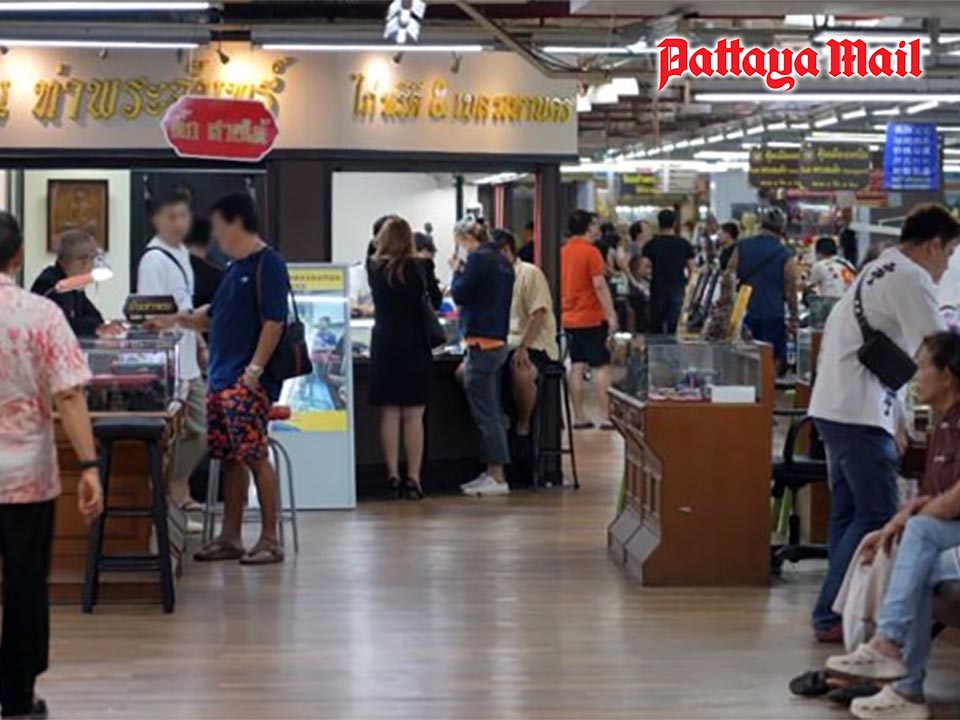
WWW.PATTAYAMAIL.COM
Chinese investment floods Thai amulet market as tourists and traders boost Pattaya’s growing demand
Chinese investors transform Thailand’s amulet market, shifting from tourists to major traders at Pantip Plaza.
PATTAYA, Thailand – The amulet business, centered around the popular Pantip Plaza in Ngam Wong Wan district of Bangkok, has become a major hub attracting foreign investors—particularly Chinese—who hold deep faith in Thai Buddhist amulets and sacred objects. This faith has translated into substantial business opportunities, leading many Chinese investors to open amulet shops within the mall. Their main customers are fellow Chinese, with transactions conducted both in physical stores and online.
Pisarn Techavipak, Vice President of the Thai Amulet and Buddha Statue Enthusiasts Association, known as “Toi Muang Non,” reveals that the overall amulet market has cooled off significantly. In 2024, sales dropped by approximately 30% compared to the booming years three to four years prior. Despite this downturn, the market is far from collapsing, as dedicated collectors and enthusiasts strive to keep trading alive. Most transactions now happen within established collector circles, with buyers hoping the pieces they acquire will appreciate in value over time. Amulets remain valuable assets that can be bought and resold.
Toi Muang Non attributes this market slowdown largely to global economic pressures impacting multiple sectors. Since amulets and sacred objects are non-essential luxury items aimed at those with disposable income, consumers are tightening their spending. This cautious financial behavior has naturally slowed the circulation of money within the amulet market.
Chinese buyers have been active in the amulet scene for decades but traditionally lacked the depth of understanding that Thai collectors and Buddhists in Southeast Asia possess. While Thai enthusiasts often focus on historic amulets famed for their spiritual power and rich histories, Chinese customers have tended to favor newer amulets, initially coming as tourists and casual collectors purchasing lower-priced items.
Since the late 1990s, many Chinese traders who initially depended on Thai intermediaries to source and authenticate amulets have started establishing their own shops, learning to distinguish genuine from counterfeit items over time. Some have even begun producing their own amulets or replicas. Today, around 20 to 30 shops in Pantip Plaza’s third floor are owned by Chinese investors, mainly selling new amulets and sacred coins, often trading in Chinese yuan to cater to their primary Chinese clientele.
Besides Chinese investors, there are also hundreds of stores owned by other foreigners from Singapore, Malaysia, and elsewhere. However, buying patterns differ: Thai collectors emphasize quality and provenance, seeking amulets with historical significance and resale potential, while many foreign traders focus more on turnover, selling amulets quickly without deep regard for long-term value.
Young Chinese investors, mostly aged between 20 and 30, initially entered the market as casual buyers but soon recognized the business potential and transitioned into agents and shop owners. The market for new amulets reached its peak when Chinese tour groups would arrive en masse to rent and buy multiple pieces, often purchasing 5-10 items per person as gifts for family or friends back in China.
This shift from tourist collectors to full-fledged traders has brought new dynamics to the market. Chinese traders have begun attending sacred ceremonies and rituals in Thailand, gaining access to renowned Buddhist masters and temples. As they gain expertise, some have even ventured into the market for older, more valuable amulets, leveraging their financial resources to outcompete local collectors.
While the core amulet trade centers around Bangkok’s Ngam Wong Wan district, Pattaya plays an important role as a tourist hotspot and cultural hub, attracting many visitors interested in Thai spiritual and cultural products, including amulets. Pattaya’s diverse international visitors, including a growing number of Chinese tourists, contribute to the demand for amulets and sacred artifacts. Local shops and markets in Pattaya often cater to these tourists, creating a secondary market for amulets outside Bangkok.
The city’s tourism infrastructure supports amulet traders by offering access to a broad customer base seeking authentic Thai spiritual items. As Chinese investment in the amulet market grows, Pattaya is positioned to benefit from spillover demand, particularly during peak tourist seasons when Chinese visitors flock to the coastal city.
Natthapong Chavalratanasukul, a veteran amulet dealer in Pantip Plaza nicknamed “Ton Tha Prachan,” explains that historically the amulet trade in Thailand was dominated by Malaysian and Singaporean buyers, especially those from southern Thailand, a region rich with famous Buddhist monks like Luang Pu Thuat. Over the past few years, however, Chinese buyers have surged into the market, capitalizing on their better knowledge of local pricing and supply channels.
Ton Tha Prachan notes that economic challenges in Thailand have ironically favored Chinese traders, as Thai collectors face reduced purchasing power. Many Chinese buyers prefer to trade within their community to avoid being sold counterfeit amulets by Thai sellers and due to language barriers. Approximately 20% of shops in Pantip Plaza are now Chinese-owned and cater exclusively to Chinese customers, not opening their doors to Thai buyers.
Despite these changes, Ton Tha Prachan recognizes that Chinese investment has injected vitality into the amulet economy. Chinese buyers tend to purchase amulets outright rather than resell them quickly, maintaining steady demand. They focus on popular, market-validated amulets that can be easily traded among Chinese collectors. However, Ton Tha Prachan warns that if Chinese shops were to vanish, Pantip Plaza would likely lose much of its vibrancy, signaling how crucial Chinese capital has become for the industry’s survival.
Traithot Chainaya, an experienced amulet dealer at Pantip Plaza, expresses concerns that excessive Chinese dominance might eventually marginalize Thai collectors. He fears a scenario where amulets become scarce or overpriced for Thai devotees, and Chinese traders gain bargaining power disproportionate to their numbers.
Other insiders note that faith and reverence transcend borders. Just as Thai people venerate Guanyin (the Chinese goddess of mercy), it is natural for Chinese Buddhists to adopt Thai amulets in their spiritual practice. This cross-cultural devotion may ultimately boost trade and keep the market vibrant, benefiting all parties.
0 Kommentare
0 Geteilt
12 Ansichten


